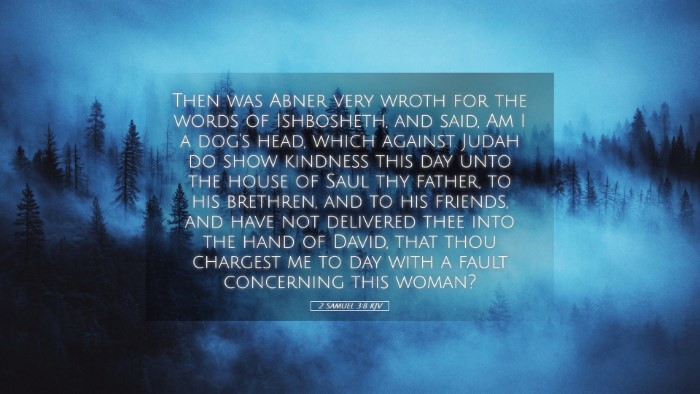Commentary on 2 Samuel 3:8
Verse Context: 2 Samuel 3:8 reveals a significant moment in the narrative of David's rise to kingship and the political dynamics of Israel during this tumultuous period. The verse states, "Then Abner was very angry for the words of Ishbosheth, and said, Am I a dog's head, which against Judah do show kindness this day unto the house of Saul thy father?" This rhetorical question posed by Abner highlights his frustration and the tension between him and Ishbosheth, the son of Saul.
Insights from Commentary
1. The Character of Abner
Matthew Henry elaborates on Abner's character, suggesting he was a man of both strength and ambition. He was a commander of Saul’s army and played a pivotal role in the power struggles following Saul's death. His reaction to Ishbosheth's accusation reveals his passionate temperament; anger reflects not only his wounded pride but also his loyalty to Saul’s lineage. This speaks volumes about the political landscape of Israel where familial loyalty often overshadowed moral integrity.
2. The Political Climate
Adam Clarke notes that the political environment was fraught with tension. Abner's loyalty to Saul's house was in direct conflict with David’s growing influence. His anger can be seen as a product of desperation, as he struggled to maintain power amidst the competing factions. The phrase "dog's head" suggests he felt devalued, indicating how titles and identities were intricately tied to honor and respect in ancient cultures.
3. Ishbosheth's Weakness
Albert Barnes offers insights into Ishbosheth’s role as king. He lacked the strength of character and leadership ability, which was evident when he confronted Abner regarding his actions. This confrontation highlights the significance of strong yet divisive leadership in the face of political instability. Ishbosheth’s leadership style stands in stark contrast to David’s emerging authority, which was gaining support not only from Judah but also prominent figures from other tribes.
4. The Rhetorical Question
The rhetorical question posed by Abner serves a dual purpose. Firstly, it seeks to awaken Ishbosheth to the reality of his own position and the gratitude that was owed to Abner for his loyalty. Secondly, it reveals Abner's fiery nature, which can be interpreted as both a strength and a vulnerability. Matthew Henry comments that such expressions of frustration can often lead to recklessness in political decision-making, as it did in Abner’s subsequent actions.
5. The Theme of Loyalty and Betrayal
Within the fabric of this narrative, the themes of loyalty and betrayal emerge prominently. Abner perceives himself as betrayed by Ishbosheth. His loyalty to Saul’s lineage is juxtaposed against his personal ambition. Henry suggests that this tension is reflective of the larger narrative of conflict between the house of Saul and the house of David. Abner's loyalty becomes deeply interwoven with his aspirations for power, highlighting a common human struggle in the pursuit of authority.
6. The Sovereignty of God
Despite the complexity of human motives, Barnes emphasizes the underlying sovereignty of God in these events. The political machinations and interpersonal conflicts serve as a backdrop to God's overarching plan for establishing David as king over Israel. The strife serves a divine purpose, facilitating the transition from Saul’s line to David’s, which directly fulfills God’s promise.
7. Application for Today's Leadership
This passage serves as a potent reminder for contemporary leaders about the dynamics of power, loyalty, and conflict. It prompts reflection on how personal ambition can cloud judgment and how leaders must navigate through relational tensions with wisdom. Often, leaders might find themselves in the place of Abner or Ishbosheth, having to balance loyalty to predecessors with the necessary change for future success.
8. Conclusion
In summary, 2 Samuel 3:8 invites deep contemplation on leadership, loyalty, and the often tumultuous nature of political power. The insights from public domain commentaries by scholars such as Henry, Barnes, and Clarke illuminate the complexities within the narrative. The emotions of anger, betrayal, and ambition provide timeless lessons that are relevant for pastors, students, theologians, and scholars alike, as they study the intricate relationship between God's sovereignty and human agency in history.


